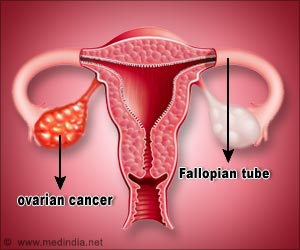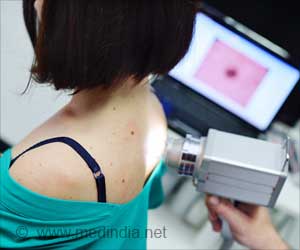Artificial intelligence (AI) can now predict how ovarian cancer patients will respond to treatment, the likely outcome, and the chances of survival. This will help in planning alternative treatments for the patient beforehand.
- Artificial intelligence (AI) can predict the survival of ovarian cancer patients
- AI can also predict the patient’s response to treatment and its likely outcome
- So, alternative treatments can be planned beforehand, without wasting precious time
- This could help save the lives of many ovarian cancer patients
The study was led by Dr. Eric Aboagye, who is a Professor of Cancer Pharmacology and Molecular Imaging in the Department of Surgery and Cancer at the Imperial College, London, UK.
The co-senior author of the paper is Professor Andrea Rockall, who is the Clinical Chair of Radiology at Imperial College, London and Honorary Consultant Radiologist at the Imperial College Healthcare NHS Trust and at The Royal Marsden Hospital, London, UK.
TOP INSIGHT
Artificial intelligence (AI) can now predict how ovarian cancer patients will respond to treatment, the likely outcome of treatment, and the chances of survival. This will help to plan alternative treatments beforehand, without wasting valuable time.
Read More..
Ovarian Cancer: Facts & Figures
- Ovarian cancer is the sixth most common cancer in women worldwide
- It usually occurs in women after menopause or in those having a family history of the disease
- Approximately 6,000 new ovarian cancer cases occur annually in the UK
- The long-term survival rate of newly diagnosed cases is only 35-40 percent
- The high mortality rate is often due to diagnosis at a much later stage, when the cancer has already spread
- The survival rate could be improved by early detection of the cancer
- The following techniques are used for diagnosing ovarian cancer:
- CA-125 Test: This blood test detects a protein called ‘Cancer Antigen (CA) 125’, which is a cancer biomarker. This test helps in the early detection of ovarian cancer
- Computed Tomography (CT) Scan: This imaging technique uses X-rays and a computer to generate detailed images of the ovarian tumor. It helps to establish the progression of cancer and decide on the best treatment options. However, CT scans cannot predict the patient’s response to therapy or the overall outcome of the disease
Study Methods
- The study was carried out between 2004 and 2015 and involved 364 women with ovarian cancer
- TEXLab, which is an AI-based software tool, was used to assess the aggressiveness of the ovarian tumors by analyzing the CT scans and tissue samples
- TEXLab examined the structure, shape, size, and genetic make-up of the tumors, which significantly influence the overall survival and prognosis of the patients
- A scoring system called Radiomic Prognostic Vector (RPV) was used to stratify the patients based on the severity of the disease – ranging from mild to severe
- The accuracy of blood test reports and standard prognostic scores were compared with the RPV scores to predict the survival of ovarian cancer patients
Study Findings
- The software was four-times more accurate in predicting deaths from ovarian cancer, compared to standard methods
- In five percent of cases with high RPV scores, the survival rate was predicted to be less the two years
- High RPV scores were associated with resistance to chemotherapy and poor outcomes following surgery
Study Implications
- Radiomic Prognostic Vector (RPV) could be used as an effective biomarker for predicting response to therapy
- This AI technology could be used for identification of patients who are unlikely to respond to standard treatments, so that they can be offered alternative treatments, without wasting precious time
Future Plans
A large-scale study is planned, with a larger number of participants in order to evaluate the efficacy of the software in accurately predicting the outcomes of surgical and medical interventions in ovarian cancer patients.Concluding Remarks
This new AI-based technology will enable doctors to provide treatment to ovarian cancer patients in a timely manner and will likely open new avenues towards the development of personalized medicine for these cancer patients.This new technology could be a paradigm shift in the way ovarian cancer patients are stratified into groups. It relies on the detection of subtle differences in the texture of the ovarian tumors on CT scans, instead of the conventional way of stratification on the basis of cancer type and extent of cancer progression.
Aboagye says: “The long-term survival rates for patients with advanced ovarian cancer are poor despite the advancements made in cancer treatments. There is an urgent need to find new ways to treat the disease. Our technology is able to give clinicians more detailed and accurate information on how patients are likely to respond to different treatments, which could enable them to make better and more targeted treatment decisions.”
Rockall concludes: “Artificial intelligence has the potential to transform the way healthcare is delivered and improve patient outcomes. Our software is an example of this and we hope that it can be used as a tool to help clinicians with how to best manage and treat patients with ovarian cancer.”
Funding Source
The study was funded by the National Institute for Health Research (NIHR) Imperial Biomedical Research Centre, the Imperial College Experimental Cancer Medicine Centre, and the Imperial College London Tissue Bank.Reference:
- A mathematical-descriptor of tumor-mesoscopic-structure from computed-tomography images annotates prognostic-and molecular-phenotypes of epithelial ovarian cancer - (https://www.nature.com/articles/s41467-019-08718-9)
 MEDINDIA
MEDINDIA




 Email
Email










